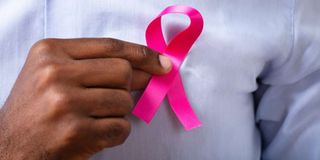How cancer cases festered as focus shifted to Covid-19

Experts now say people missed out on potentially life-saving scans.
Cancer prevention measures have stalled after focus shifted to Covid-19, with the two making for a double tragedy for patients and their families.
Experts now say people missed out on potentially life-saving scans after non-Covid-19 services ground to a halt — by default — as all the resources were directed to fighting the pandemic.
Professional bodies say partial lockdown of the country for some months due to the coronavirus left a backlog of cases where cancer patients were taken to hospital in acute condition.
Mr David Makumi, vice-chairman of the Non-Communicable Disease Alliance, said the pandemic has had a huge impact on preventive measures.
“The launch of the human papillomavirus (HPV) vaccine against cervical cancer, which was introduced to the Health ministry’s routine immunisation schedule last year, has not gone on as it should have due to movement restrictions imposed by the government.
This is because there were not enough campaigns and mobilisation, which affected the fight against this particular type of cancer,” he said.
Mr Makumi added that the Health ministry did not put up screening camps this year, which usually attract crowds and could potentially have aggravated the spread of the virus.
“The number of people who die from cancer is about 110 a day, and that has not changed with the pandemic. In fact, the number may have gone up due to lack of access to facilities, many of which have been taken up by efforts to expand Covid-19 isolation facilities,” he said.
He added that some individual hospitals reduced scans considerably, particularly small private facilities.
The stalled cancer prevention interventions is something Dinah Kassaman, Rachel Wangari Kimani and Adelaide Lusambili of Aga Khan University are more than familiar with, having written a paper on it.
The paper, published by the National Centre for Biotechnology Information, titled “Challenges for Cancer Care During the Covid-19 Pandemic in Kenya: Policy Implications”, indicated that, while seeking to contain the spread of Covid-19, the Ministry of Health enacted measures to enforce social distancing.
They said the dusk-to-dawn curfew and other measures, which included a ban on travel in the cities, where cancer services are mainly offered, to and from all rural areas, was a one-size-fits-all Covid-19 containment strategy that hurt cancer patients.
They added that the lockdown did not come with provisions for patients who needed to travel to cancer care facilities and lived away from home to continue getting treatment.





